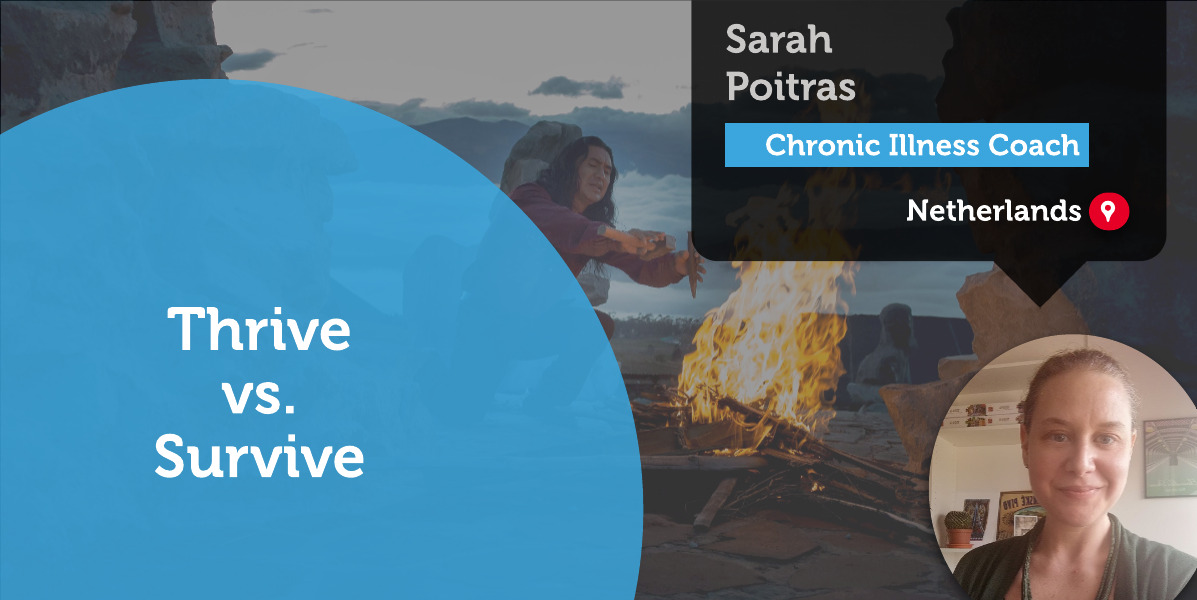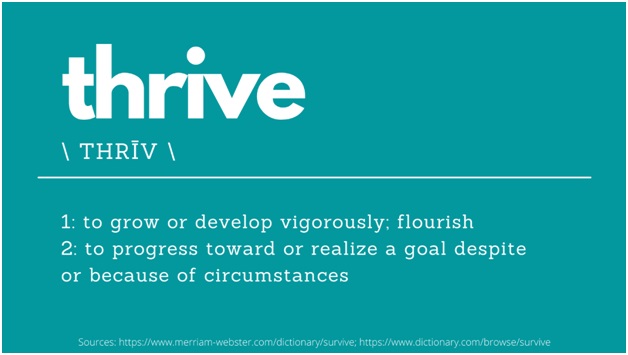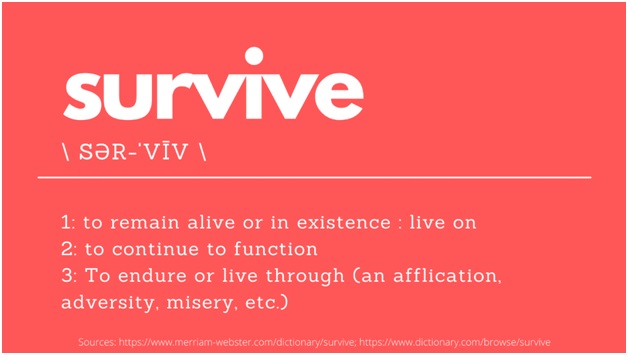A Coaching Power Tool By Sarah Poitras, Chronic Illness Coach, NETHERLANDS

When you’re in survival mode, you numb yourself. Clemantine Wamariya (as cited in Colin 2018)

Throughout history, humans have spent most of our waking moments simply trying to survive. Many of us now live in a time when most of our basic survival needs are met – and yet we are still living in survival mode. This can get in the way of us living our most fulfilled lives. According to psychologist Abraham Maslow (1943), one can only reach the highest levels of fulfillment and self-actualization after one’s basic physiological and safety needs are met. When you’re constantly in survival mode, you’re essentially stuck in meeting these base needs.

Though applicable to many people, it can be even more challenging for people living with chronic illnesses. When you’re diagnosed with something incurable, in many ways life does become all about survival. It’s okay – even necessary – for that to be the way you live in the beginning: trying to figure out your new normal, your new limits, your new needs. However, at some point, the act of always trying to survive becomes exhausting and counterproductive to living a fulfilling life.
Personal Case Study
My mission in life is not merely to survive, but to thrive; and to do so with some passion, some compassion, some humor, and some style. Maya Angelou
I know first-hand what this is like. In 2010, I was diagnosed with progressive, incurable lung disease. A few months after my diagnosis, I had a decision to make. My husband and I had a trip planned and didn’t know if we should go. I had just learned I would need to fly with supplemental oxygen, I had just started taking an experimental medication, and I thought my lungs might collapse at any moment (it’s one of the symptoms of my disease). My doctor urged us to go and not let this disease stop us from living our lives.
Upon reflection, I now realize that it was a decision between surviving and thriving. It required a mindset shift about what was most important. I also have come to see that throughout the past 11+ years of living with this disease, the times I’ve felt most fulfilled and at my best are when I’m viewing things from a thrive perspective versus a survival perspective.
When I was living in a state of survival, I was just getting by. Because I was so focused on just getting through each day, I was closing myself off – to the world and other parts of myself.
It took a long time for me to recognize when I could stop just “surviving.” I now see that I could have been more purposeful about this by being more present and aware of my needs, and also by understanding the benefits of pushing myself to thrive. Now that I’m conscious of this, I see myself reaping the benefits and I want to help others in similar situations do the same.
Definitions Thrive vs. Survive Understanding of Coaching Methodologies
Life comes from physical survival; but the good life comes from what we care about. Rollo May
An article in Scientific American helped me better understand what the concepts of thriving and surviving might mean to people living with chronic illness. The author wrote, “when individuals are confronted with a challenge, they may succumb or they may respond in one of three ways: They may survive (continuing to function but in an impaired fashion), recover (return to previous levels of emotional, social and psychological functioning), or thrive (to go beyond the prior baseline, to grow and flourish).”
Digging into some dictionary definitions yields further insight. I am using those that can best support this perspective shift for people living with chronic illness based on my personal experience and understanding of coaching methodologies.
Survive (Dictionary.com, Merriam-Webster):
- To remain alive or in existence: live on
- To continue to function
- To endure or live through (an affliction, adversity, misery, etc.)
Thrive (Dictionary.com, Merriam-Webster):
- To grow or develop vigorously; flourish
- To progress toward or realize a goal despite or because of circumstances
These definitions illustrate key differences between surviving and thriving. When considering a perspective to take on life, there’s a stark difference between enduring and progressing; between continuing to function and growing vigorously.
Surviving feels heavy and limiting. The following exploration of this topic by LeMar Moore is especially compelling. He writes, “In survival mode, you spend so much time focusing on the dangers that you miss out on the opportunities… Survival mode shuts off the part of you that takes risks, uses your imagination, and goes with the flow, and instead directs all that precious energy to the part that plays it safe, holds on to regret and resentment, and too often demands control.”
It brings to mind yet again Maslow’s theory. Using hunger as an example, he writes of the truly hungry person: “capacities that are not useful for this purpose lie dormant, or are pushed into the background.” If you live your life in survival mode, you will ignore or suppress your higher-level needs, your dreams, and the capacities and strengths you have within you to fulfill them.
This is how I lived for several years after my diagnosis: getting by, persisting, surviving – but not much more. Taking the other perspective is freeing. It’s a much more optimistic, open-minded place to live. Flourishing, progressing towards goals, and using your circumstances to do it. Taking that perspective lit a fire in me. I have learned to view my disease as something that has given me opportunities, not taken them away. This is a much lighter, more fun place to live and has provided me with so much more room for growth and fulfillment.
Exploring the Concept of Thrive vs. Survive
This thrive vs. survive power tool will be integral in my work coaching people with chronic illness. The definitions are a simple yet effective place to start helping someone shift from a survive to thrive perspective. Some powerful questions that may be helpful around this are:
- What do you need to survive?
- What do you need to grow?
- What would thriving look like to you?
- How can you use your circumstances to progress towards your goal (vs letting them stop you)?
Other coaching tools and concepts can also help support this shift. It is also interesting to look at how these tools themselves can be seen through a lens of thrive vs survive.
Maslow’s Hierarchy of Needs:
- Helping clients look at their lives about Maslow’s Hierarchy of Needs, consider where they are, what they have, what they need, and how they can use all of that to progress towards self-actualization
Exploration of Values:
- Helping clients understand their values and see how a survive vs. thrive mindset might be holding them back from living their values completely
Wheel of Life:
- Helping clients understand what’s important to them, where they spend their time and energy, and how adopting a thrive vs survive perspective may help address any imbalances
PERMA:
- Helping clients evaluate their lives according to the PERMA theory of well-being by thinking through which elements of the model need a little more tending to fully flourish
Exploration of strengths:
- Helping clients identify their strengths and how they could use them more purposefully to overcome challenges and thrive
- Note, this exercise could be done as part of a PERMA evaluation or on its own
Exploration of Purpose:
- Helping clients realize or define their life purpose and ways to work towards it using their strengths, values, and a thrive vs. survive mindset
Exploring the concept of thrive vs. survive and reflecting on how I have applied it in my journey with living with chronic illness so far, I am excited by the new opportunities for its application both for myself and my potential clients.
References
Angelou, M. Maya Angelou: In her own words [Online].BBC News.
Colin, C. ‘A Story for the Broken’, San Francisco Magazine, May issue
Dictionary.com. Survive [Online]. Dictionary.com.
Dictionary.com. Thrive [Online]. Dictionary.com
Kaufman, S.B. Is an Optimistic Mind Associated with a Healthy Heart [Blog] Scientific American
Maslow, A.H. ‘A Theory of Human Motivation, Psychological Review.
May, R. Rollo May Quotes Quotable Quote
Merriam-Webster. Survive
Merriam-Webster. Thrive
Moore, L. Survival Mode is Killing You. [Blog] Mastermind Connect.